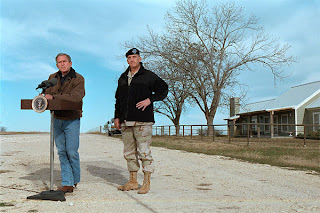You want fries with that?

"In testimony before the the Senate Armed Services Committee in February 2003, General Eric Shinseki [Obama's excellent choice to head the V.A. Administration], the army chief of staff, expressed the view that occupying Iraq might pose a daunting challenge and could require several hundred thousand troops. This departed from the Bush administration's vague but rosy preictions about the war and its aftermath. Shiseki's candor elicited immediate rebukes from Rumsfeld and his deputy. The general's estimate was "wildly off the mark", an obviously annoyed Wolfowitz informed the press. Shinseki became persona non grata and was soon ushered into retirement.
 Shinseki's fate offered an object lesson to his peers. In Rumsfeld's Pentagon, generals did not ask questions; they did not express independent views, even to Congress; they did as they were told. No one got the word quicker than General Tommy Franks, the officer who as commander of the U.S. Central Command planned and implemented the invasion of Afghanistan and Iraq. When it came to pleasing Rumsfeld, Franks was nothing if not eager. Asked by President Bush prior to the Iraq War to offer his own views, the general replied, "Sir, I think exactly what my secretary thinks, what he's ever thought, whatever he will think, or whatever he thought he might think.""
Shinseki's fate offered an object lesson to his peers. In Rumsfeld's Pentagon, generals did not ask questions; they did not express independent views, even to Congress; they did as they were told. No one got the word quicker than General Tommy Franks, the officer who as commander of the U.S. Central Command planned and implemented the invasion of Afghanistan and Iraq. When it came to pleasing Rumsfeld, Franks was nothing if not eager. Asked by President Bush prior to the Iraq War to offer his own views, the general replied, "Sir, I think exactly what my secretary thinks, what he's ever thought, whatever he will think, or whatever he thought he might think.""Andrew J. Becevich, The Limits of Power: The End of American Exceptionalism (Holt and Co.; New York, 2008): pp. 98 - 99.
Andrew J. Bacevich is a professor of history and international relations at Boston University, retired from the U.S. Army with the rank of colonel. He is the author of The New American Militarism, among other books. His writing has appeared in Foreign Affairs, The Atlantic Monthly, The Nation, The New York Times, The Washington Post, and The Wall Street Journal. He is the recipient of a Lannan award and a member of the Council on Foreign Relations.

(initial italics & bold mine)

<< Home